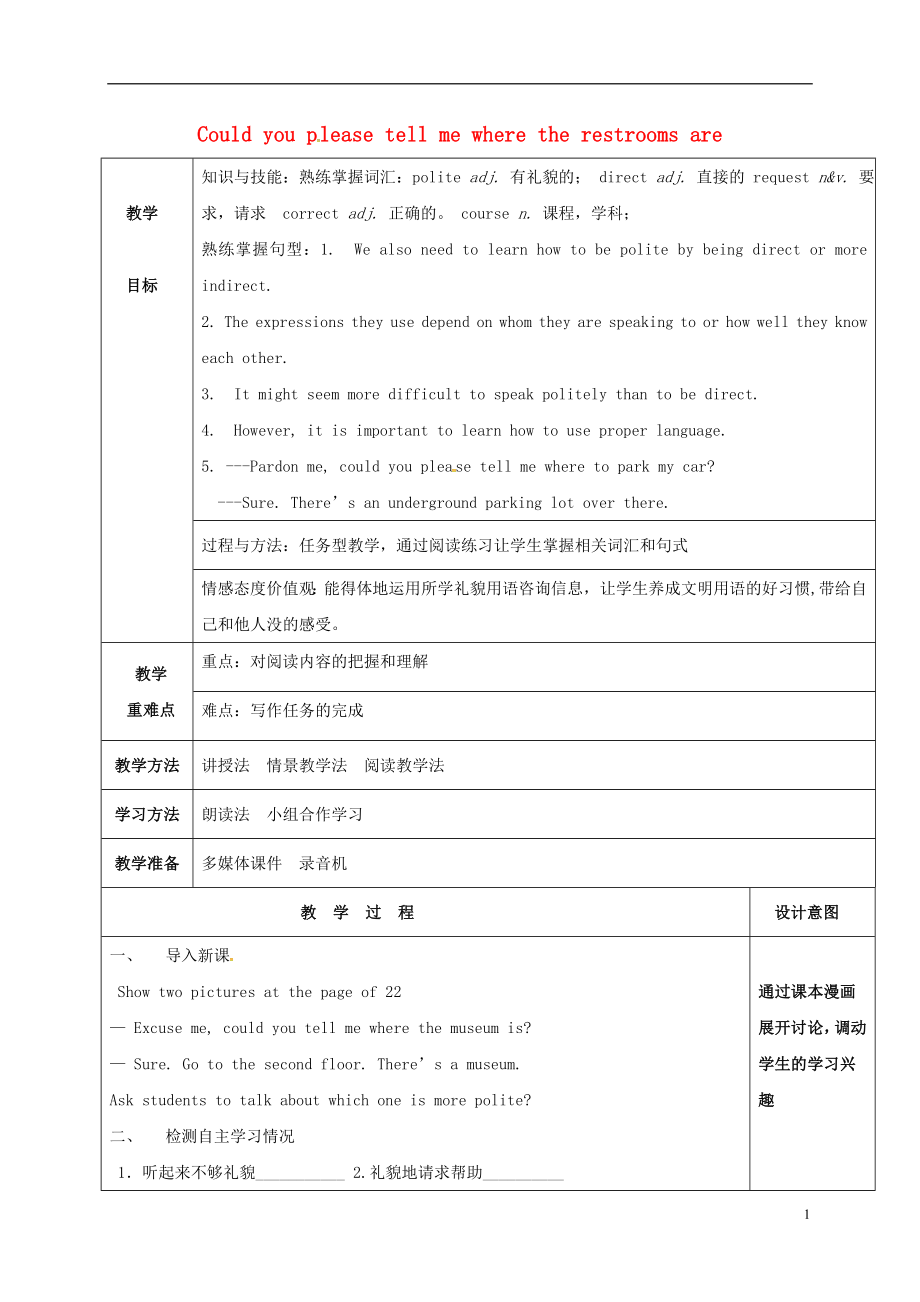《陜西省延安市富縣羊泉鎮(zhèn)九年級(jí)英語(yǔ)全冊(cè) Unit 3 Could you please tell me where the restrooms are(第6課時(shí))教案 (新版)人教新目標(biāo)版》由會(huì)員分享,可在線閱讀���,更多相關(guān)《陜西省延安市富縣羊泉鎮(zhèn)九年級(jí)英語(yǔ)全冊(cè) Unit 3 Could you please tell me where the restrooms are(第6課時(shí))教案 (新版)人教新目標(biāo)版(3頁(yè)珍藏版)》請(qǐng)?jiān)谘b配圖網(wǎng)上搜索��。
1��、
Could you please tell me where the restrooms are
教學(xué)
目標(biāo)
知識(shí)與技能:熟練掌握詞匯:polite adj. 有禮貌的�����; direct adj. 直接的 request n&v. 要求����,請(qǐng)求 correct adj. 正確的�。 course n. 課程,學(xué)科��;
熟練掌握句型:1. We also need to learn how to be polite by being direct or more indirect.
2. The expressions they use depend on whom
2、they are speaking to or how well they know each other.
3. It might seem more difficult to speak politely than to be direct.
4. However, it is important to learn how to use proper language.
5. ---Pardon me, could you please tell me where to park my car?
---Sure. There’s an underground parking l
3��、ot over there.
過(guò)程與方法:任務(wù)型教學(xué)��,通過(guò)閱讀練習(xí)讓學(xué)生掌握相關(guān)詞匯和句式
情感態(tài)度價(jià)值觀:能得體地運(yùn)用所學(xué)禮貌用語(yǔ)咨詢信息��,讓學(xué)生養(yǎng)成文明用語(yǔ)的好習(xí)慣,帶給自己和他人沒(méi)的感受����。
教學(xué)
重難點(diǎn)
重點(diǎn):對(duì)閱讀內(nèi)容的把握和理解
難點(diǎn):寫作任務(wù)的完成
教學(xué)方法
講授法 情景教學(xué)法 閱讀教學(xué)法
學(xué)習(xí)方法
朗讀法 小組合作學(xué)習(xí)
教學(xué)準(zhǔn)備
多媒體課件 錄音機(jī)
教 學(xué) 過(guò) 程
設(shè)計(jì)意圖
一����、 導(dǎo)入新課
Show two pictures at the page of 22
— Excuse me, could you tell me wh
4、ere the museum is?
— Sure. Go to the second floor. There’s a museum.
Ask students to talk about which one is more polite?
二����、 檢測(cè)自主學(xué)習(xí)情況
1.聽起來(lái)不夠禮貌___________ 2.禮貌地請(qǐng)求幫助__________
3.在不同的環(huán)境下______________ 4.聽起來(lái)不禮貌_________
5.導(dǎo)入…. ____________ 6. 一個(gè)直接的問(wèn)題_______________
7.直接地問(wèn)問(wèn)題_____________ 8。去
5�、哪停車_______________
9.與他人更好地交流______________10.對(duì)不起,給你添麻煩了___________
1.Can read new words correctly .(每組四號(hào)展示)
2.Translate some phrases into Chinese.( 每組三號(hào)展示)
3.Discuss some key words and sentences in their groups.
三�、 講授新課
1. Read the article and match paragraph with its main idea.
2. Read the
6、article and underline the topic sentence for each paragraph.
3. Read the article again and answer the questions.
Read paragraph 1 and answer the question.
---What else do we need to learn besides asking a question correctly when you ask for help?---We need to learn how to be polite when we ask f
7���、or help.
Read paragraph 2 and answer the question.
---What do we need to think about when you talk to different people?
---We need to think about whom we speak to or how well we know them.
Read paragraph 3 and answer the question.
---What can lead in to a request with a stranger on the street?
8���、
---“Excuse me, I wonder if you can help me” or “I’m sorry to trouble you, but …” before asking for help.
4. Find all the direct questions and polite requests from the passage.
四����、課堂小結(jié)
Summarize what we have learnt in this class.(每組一號(hào))
通過(guò)課本漫畫展開討論�����,調(diào)動(dòng)學(xué)生的學(xué)習(xí)興趣
復(fù)習(xí)強(qiáng)化剛剛學(xué)過(guò)的單詞�����。
通過(guò)各種任務(wù)
9����、讓學(xué)生理解文章。
讓學(xué)生歸納本節(jié)課學(xué)習(xí)收獲�。
板書
設(shè)計(jì)
Unit 3
Could you please tell me where the restrooms are? Section B 2a-2d
1. Where are the restrooms?
Could you tell me where the restrooms are?
2. When is the school trip?
Excuse me, Mr. West. Do you know when the school trip is?
3. Peter, tell me your e-mail address.
Peter, could you please tell me your e-mail address?
4. Where’s the post office?
Pardon me, could you please tell me where to park my car?
3
 陜西省延安市富縣羊泉鎮(zhèn)九年級(jí)英語(yǔ)全冊(cè) Unit 3 Could you please tell me where the restrooms are(第6課時(shí))教案 (新版)人教新目標(biāo)版
陜西省延安市富縣羊泉鎮(zhèn)九年級(jí)英語(yǔ)全冊(cè) Unit 3 Could you please tell me where the restrooms are(第6課時(shí))教案 (新版)人教新目標(biāo)版

